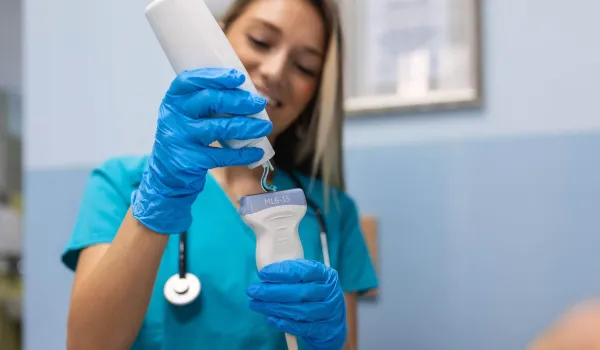
Having completed a Bachelor of Science nursing degree, registered nurses use their education and training to deliver enhanced patient care. BSN-RNs are also qualified to take on a wide range of positions in various health care facilities. Their extensive skill set qualifies them to perform a wide range of tasks relating to patient care.
Comprehensive Education and Training

BSN-RNs complete a challenging academic curriculum with an evidence-based foundation, giving them a breadth and depth of knowledge beyond associate degree or diploma nursing programs. At Concorde Career College, our RN to BSN program focuses on advanced clinical skills and in-depth nursing theory and practice. BSN education is built on the following foundational elements:
- Clinical skills and knowledge: Comprehensive training in advanced patient care can equip RNs to handle complicated clinical situations confidently.
- Leadership and management programs: Management skills are required for leadership roles to manage teams better and provide optimal patient care.
- Research and evidence-based practice: Research methodology and practice can allow RNs to provide care based on the latest scientific evidence.
- Community and public health nursing: One of the responsibilities of BSN-educated nurses is to work in community health settings, and focusing on public health issues is an integral part of this program.
- Critical thinking and decision-making skills: Effective problem-solving relies on analyzing information to make sound decisions that lead to best practices in patient care.
Our RN to BSN program can prepare nurses for complex duties that vary depending on the situation, such as direct patient care, research, administration, and public health initiatives. The RN to BSN curriculum incorporates competent clinical instruction focusing on leadership and evidence-based practice.
Related: What is RN to BSN?
Direct Patient Care Responsibilities
BSN-RNs are key players in direct patient care settings, where their extensive education allows them to perform various tasks competently. Part of their basic duties is to conduct detailed patient evaluations and develop a personalized care plan.
BSN-RNs can administer medications and treatments to patients as ordered by a licensed health care practitioner. Their educational background can help them stay up to date with the latest research findings that they can use in their care plans.
Another area of importance that BSN-RNs excel in is monitoring their patients' progress. They're in tune with their patients' conditions and realize when something has changed and whether a care plan should be adjusted.
Education for patients and their families is an essential part of the BSN-RN's job duties. Instructions to patients and family members are essential when dealing with ongoing health conditions and preventive health care, as they allow patients to be proactive in their health management.
An essential part of a BSN-RN's job duties is collaboration. They work as part of an interdisciplinary health care team, using their specialized knowledge to collaborate on patient care while optimizing outcomes. According to online resources, research has demonstrated that patients who receive comprehensive, evidence-based care from BSN-prepared nurses have better outcomes in terms of lower mortality rates, fewer readmissions, and shorter stays.
Leadership and Management Roles

The education BSN-RNs prepares them for management and leadership positions in health care settings. Their training focuses on clinical skills and leadership, allowing them to best oversee and improve health care operations. Here are some highlights of their roles within leadership and management:
- Providing supervision and mentorship to nursing staff: While all RNs can supervise and mentor nursing staff, BSN-RNs take on this responsibility more often, raising the level of care and nursing in the facility.
- Coordinating interdisciplinary patient care: These nurses are adept at working with multiple team members to coordinate and manage patient care, allowing for seamless and holistic care.
- Participating in quality improvement projects: With a strong background in evidence-based practice, they can be leaders in quality improvement projects. They analyze clinical data and develop plans to enhance patient care.
- Encouraging the development and implementation of policy: Their standard of knowledge makes BSN-RNs a key component in creating and implementing health care policies and ensuring that they're relevant to clinical practices.
- Managing resources and budgeting: BSN programs train nurses to manage resources and budgets for efficient health care delivery and streamlined operations in health care facilities.
The American Nurses Credentialing Center recognizes the importance of BSN-prepared nurses in leadership by requiring nurse leaders in Magnet-designated hospitals to hold at least a BSN degree.
Specialized Nursing Roles
A Concorde RN to BSN degree can equip nurses with a well-rounded education in the science and art of nursing, preparing them for the diverse needs of patients while navigating advancements in health care technology. With this foundation, BSN-RNs are well suited for various specialized roles, including:
- Critical care
- Pediatric care
- Oncology
- Public health
- Informatics
- Case management
The American Medical Informatics Association expects the demand for informaticians will continue to rise, with up to 70,000 informaticians needed due to advances in record technology. The duration of education is important in a time when technology influences every aspect of health care.
Research and Evidence-Based Practice

BSN-RNs play a key role in promoting a high-quality environment in nursing with improved patient outcomes. Because BSN programs focus on research practice and understanding, BSN-prepared nurses can participate in research studies and quality improvement projects, contributing to groundbreaking patient care strategies.
Our RN to BSN program can prepare nurses to assess the credibility and relevance of emerging health services and technology and their impact on patient care. This can give a theoretical basis for technology integration and evidence-based practice to improve health outcomes and patient safety.
As part of the evolving health care landscape, BSN-educated nurses are at the forefront of implementing new solutions and establishing best practices that will shape future patient care. The focus is on strategies that have a scientific basis and can help nurses enhance the health of individuals and populations by bridging the gap between care and research.
The RN to BSN program's breadth of topics in the health care field may prepare nurses to pursue a range of careers and establish them as leaders in the health care sector. Incorporating research, evidence-based practices, and ongoing education can further promote successful BSN-RNs, highlighting their role in health care advancement.
Community and Public Health Nursing
BSN-RNs are essential in community and public health settings, where their broad training is beneficial when addressing larger health issues for communities. The curriculum taught in BSN education can prepare registered nurses to assess and be aware of the needs of their community, allowing them to meet population health needs.
They can design and implement comprehensive health and disease prevention programs tailored to the needs of diverse populations. Graduates can work with community organizations and other partners to help coordinate effective systems of care for local and regional health concerns. This partnership is beneficial when addressing health disparities and the social determinants of health, both of which must be considered to ensure fair health care access and results.
Their training in public health emergencies and disaster response makes them essential first responders in times of crisis. Quickly assessing the situation, utilizing available resources, and providing care under pressure and overload are just a few examples of the daily tasks performed by BSN-RNs.
Better health outcomes for communities can be promoted by recognizing and valuing the contributions of community and public health nurses with a Bachelor of Science degree. By improving public health through knowledge, prevention, and treatment of large-scale health clinics, they impact the lives of individual patients as well as populations in entire communities. This holistic viewpoint highlights the significance of their role in health care.
Prepare for the next step in your nursing career and explore Concorde's RN to BSN program. Advance your skills, expand your opportunities, and make a greater impact in health care. See how Concorde can help you achieve your goals by contacting admissions today to learn more about enrollment, program details, and how to get started.
2 The Baccalaureate Degree in Nursing as Minimal Preparation for Professional Practice. (2000, December 12). Www.aacnnursing.org. https://www.aacnnursing.org/news-data/position-statements-white-papers/baccalaureate-degree-in-nursing-as-a-minimal-preparation
3 New Graduate Employment Data. (n.d.). Www.aacnnursing.org. https://www.aacnnursing.org/news-data/research-data-center/new-graduate-employment-data
4 American Nurses Credentialing Center. (2023). Eligibility criteria. ANA. https://www.nursingworld.org/organizational-programs/magnet/apply/eligibility-criteria/
5 Nurse Roles & Responsibilities For BSN Nurse. (n.d.). Www.registerednursing.org. https://www.registerednursing.org/degree/bsn/roles/
Take The Next Step Towards a Brighter Future
Interested in learning more about our RN to BSN program?
We have a Concorde representative ready to talk about what matters most to you. Get answers about start dates, curriculum, financial aid, scholarships and more!







